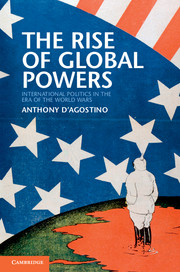Book contents
- Frontmatter
- Contents
- Maps
- Acknowledgements
- Introduction
- 1 The great powers at the dawn of world politics
- 2 Global origins of World War I: from the China scramble to the world crisis of 1904–1906
- 3 Global origins of World War I: a chain of revolutionary events across the world island
- 4 Balance and revolution, 1914–1918
- 5 A ragged peace, 1919
- 6 Scramble for Eurasia, 1919–1922
- 7 Drastic acts of unhappy powers, 1922–1923
- 8 Storms in the lull, 1924–1927
- 9 Politics and economics of the great slump, 1928–1933
- 10 A vogue for national economy
- 11 Mussolini’s moment, 1933–1935
- 12 The global civil war, 1936–1937
- 13 Last years of peace, 1937–1939
- 14 The European war, 1939–1941
- 15 The world war
- 16 Balance and hegemony
- Maps
- Notes
- Index
7 - Drastic acts of unhappy powers, 1922–1923
Published online by Cambridge University Press: 05 June 2012
- Frontmatter
- Contents
- Maps
- Acknowledgements
- Introduction
- 1 The great powers at the dawn of world politics
- 2 Global origins of World War I: from the China scramble to the world crisis of 1904–1906
- 3 Global origins of World War I: a chain of revolutionary events across the world island
- 4 Balance and revolution, 1914–1918
- 5 A ragged peace, 1919
- 6 Scramble for Eurasia, 1919–1922
- 7 Drastic acts of unhappy powers, 1922–1923
- 8 Storms in the lull, 1924–1927
- 9 Politics and economics of the great slump, 1928–1933
- 10 A vogue for national economy
- 11 Mussolini’s moment, 1933–1935
- 12 The global civil war, 1936–1937
- 13 Last years of peace, 1937–1939
- 14 The European war, 1939–1941
- 15 The world war
- 16 Balance and hegemony
- Maps
- Notes
- Index
Summary
The Washington Naval Conference was an effort to reconcile the world’s naval powers which presupposed that these were really the only powers. France, Germany, Soviet Russia, China, and Poland, all land powers, were of a secondary order of importance. At the same time there was an attempt to balance the naval power of Japan and of France. Italy, almost written off in 1919, was in effect employed to balance France in the Mediterranean. The French even thought that Italy was granted a kind of superiority there. This was coupled with an attitude that favored the gradual normalization of the German situation in Europe, largely through humane efforts to lessen the reparations burden. It was not thought that Germany needed to be considered as a European power. Nor did many think ahead to the possibility of its full military recovery one day. Nevertheless, kindness toward Germany was a factor in balancing French hegemonism and militarism.
China’s situation in the Far East was similar. Kindness toward China was a factor in balancing Japan. Normalization in this regard was, as with Germany, largely thought of as a financial question rather than a military or political one. Neither China nor Russia was forecast as a factor in world politics for at least a generation. It was a victory of Mahan, who thought largely in terms of navies and rimlands, over Mackinder, who thought largely in terms of railroads and land power. The world balance was thought to have been fixed by treaty. Since it was a naval balance, there was not much sense of a need for armed forces, especially armies, to maintain it. The United States, arguably the world co-hegemon, after a spate of furious naval building from 1918 to 1921, scrapped ships to treaty specifications and neglected to build up to the treaty limits for the rest of the decade. It cut its army air force from 20,000 to 10,000 and made do with around 3,000 planes. Instead of extending financial aid to China, presumably to improve the Asian balance and maintain American interest, American officials were persuaded to take a purely financial view of the matter and concentrate investment on Japan, where it seemed to be more productive and economical.
- Type
- Chapter
- Information
- The Rise of Global PowersInternational Politics in the Era of the World Wars, pp. 162 - 189Publisher: Cambridge University PressPrint publication year: 2011



